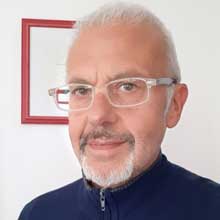Let’s talk about you: what is your background, what do you teach, and what are your research interests?
I come from Ferrara, where I still live. At Ca’ Foscari I teach both theoretical subjects (Environmental Matrices Data Analysis, Chemometrics for 2 courses of the Master’s Degree Programme in Environmental Sciences and in Biotechnology) and practical subjects (Analytical Chemistry Laboratory, and Field Exercises for the Master’s Degree Programme in Environmental Sciences).
My main research interests are the study, characterisation, monitoring and interpretation of data on environmental, food and art contamination. I develop new analytical methods to detect organic microcontaminants in different environmental matrices and in different areas of the planet, and I study the mechanisms of pollutant transport and build-up.
What was your academic career?
I graduated in Chemistry at the University of Ferrara, where I then specialised in chemometric data analysis, and in the development of predictive models of environmental chemical and physical properties, at the Istituto Superiore di Sanità (Institute of Public Health). I then became first a Researcher (back in 1996), then an Associate Professor in Analytical Chemistry at the Department of Environmental Sciences (now Department of Environmental Sciences, Informatics and Statistics) of the Ca' Foscari University.
What are your professional references?
In the past, definitely Maria Livia Tosato, at that time director of the Istituto Superiore di Sanità: she passed on to me knowledge, enthusiasm, and passion. The keyword that recurs in this interview is ‘cultural legacy’, which I want to pass on through my work. This person later became first scientific attaché at the US Embassy, and then scientific advisor at the Italian Presidential Palace.
What were your greatest professional satisfactions?
It is hard to list them. My job gives me a lot of satisfaction. There are two things that give me the greatest satisfaction, and they are both linked to the great opportunity to transmit and pass on what I have learned. Being cited by the international scientific community for the things I continuously learn, but above all being able to pass on this knowledge to students, and have them confirm, even after many years, when they may have become professionals (or in some cases colleagues) that I have left a permanent educational, human and professional imprint. In two words: cultural legacy.
What is the aspect of your research you are most passionate about?
Satisfying my curiosity. Asking myself questions, and designing a way to solve them, or to better understand my surroundings.
Have you always known that this was going to be your path?
Absolutely not. As a student, I thought that the university career was only for ‘those who could afford it’, with long years of job insecurity. Having humble origins (my father was a worker with a third grade education and my mother a housewife with a fifth grade education), my goal was to graduate and find a ‘stable’ job as soon as possible, such as in a company. Then, a series of coincidences brought me closer to the world of research, and I found wonderful people, humble but of great value, who took me by the hand, knew how to appreciate me and taught me what it means to research (at the Istituto Superiore di Sanità) and passed on their passion for research and teaching.
What do teaching and researching mean to you?
I have already partly answered: leaving a cultural legacy. To make a humble but significant contribution to new generations.
Can you offer any advice to researchers in the early stages of their career?
Research is passion, above all else. And it is curiosity. Research has no working hours. Get ready to be scientists, but at the same time handymen, technicians, get ready to 'get your hands dirty', to humbly learn about everything that surrounds you, to never take anything for granted, to know how to listen, read, study before drawing conclusions. Remember that there is no such thing as absolute truth. The world is complex, and researching means opening a window of clarity in a damn complicated world.

